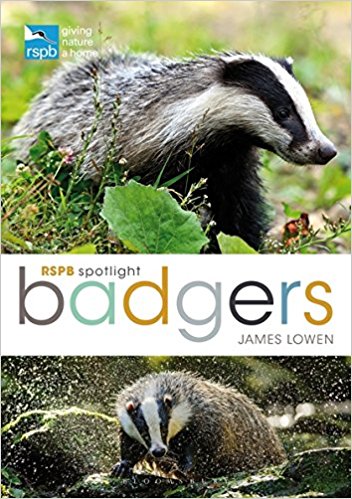Water
| RSPB Spotlight on Badgers book |
 |
James
Lowen explores the lives of badgers and their communal
living, feeding habits and threats to their conservation. Click
here to buy:
Paperback edition
Kindle edition
|
The summer of 2003 was one of the longest, hottest and
driest for many years; and there were reports of badgers doing
strange things - such as coming out of their setts in the early
afternoon, and even entering garages, sheds, houses and even
ground-floor bathrooms! Such strange behaviour may be seen in
very rare cases at any time, but the greater frequency was believed to be that badgers
were getting extremely dehydrated because of the lack of wet food and streams, ponds and
puddles being dried up.One of the most useful things gardeners can do for wildlife (of
any kind); is
to have a fresh supply of water. How you do this is down to you.
Some people like to leave out metal bowls of clean water in warm
summer evenings, whereas other like to have a small shallow pond
with some sort of pumped water supply (or even a temporary hosepipe). In
short, having fresh water in your garden (or on your golf-course
or farm) will normally do wonders for lots of different types of
wildlife.
If you are worried about "wasting" water or the cost
of water used if you are on a water meter, remember that you can
still have a small pond with a fountain; and the water can be
re-circulated within the pond. The only "waste" is what
evaporates and what the animals drink.
Remember too that badgers which are dehydrated will also be
very determined to get at wet food; and will be tempted to dig up
lawns and flowerbeds to get at worms, beetles, bulbs roots and
tubers; and may make very determined efforts to route through
bins. By having a ground-level water supply, you might save
yourself a lot of garden or crop damage.
The next time you are watering the garden just after the sun
has gone down, think about the wildlife in your garden. An
upturned old dustbin lid or a shallow (i.e. cut down) washing up bowl
in a quiet corner might help your garden visitors if they are
thirsty. Badgers also drink from tree boles, so topping those up
may help too.
In terms of feeding badgers, fresh water is perfect. Some people
unwisely leave out dishes of milk or cream. This is generally OK for
badgers, but harmful for hedgehogs. Hedgehogs can not digest cows
milk or dairy
products. Eating too much milk or cream will damage a hedgehog's
digestive system. Unfortunately, the hedgehog doesn't know this;
and will eat or drink it anyway; and will eventually become ill.
In short, do not leave out milk or cream or any other dairy
product.
Wildlife species - including badgers will come to rely on
large handouts; so you should be careful to plan in
advance. Make sure if you feed large amounts that you can always
do this, so you will need to be sure of reliable holiday
"cover" for when you are away.
If you are interested in leaving out food for the badgers, then
have a look at our Feeding page.
Wildlife Diseases
If you want to attempt to civilise them (by providing a bowl),
then use one of more METAL dog-type bowls, which are difficult to
tip over (e.g. one for water and one for food). Badgers may be
very rough with bowls - for example, biting them, kicking them,
clawing at them and even using them in tug-of-war fights, and
CERAMIC OR GLASS BOWLS WILL GET BROKEN eventually.
To avoid the possibility of cross-contamination, have
"badger-only" bowls; and wash them separately from items
used for people or other pets.
Using rubber-gloves, clean the dishes using very hot water with
a decent quantity of soap/detergent.
Use a badger-only dishcloth and tea-towel; and follow strict
hygiene precautions. This is especially important if any of the
following apply:
- you have any babies or young children
- you have any-one who is or may be pregnant
- you have any-one who is elderly or infirm
- you have any-one who may have a suppressed immune system
Note that this advice does not mean to imply that badgers are
riddled with disease - it's just pragmatic, common-sense advice to
be followed if you come into contact with any animal species.
|
